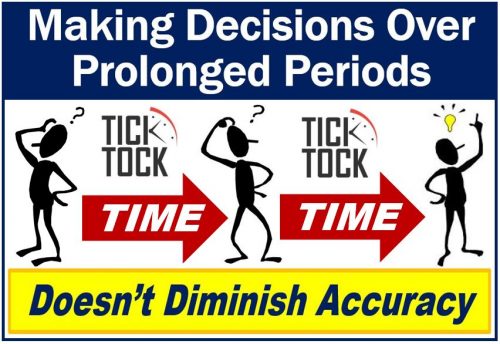When people are making decisions over prolonged periods, their accuracy is not affected negatively, a new study has found. When we make good decisions, we have typically gathered information over at least several seconds. This is much longer than the amount of time individual brain cells take to process their inputs.
Even so, this disparity does not undermine our ability to make accurate choices, say researchers from New York University (NYU).
Michael Waskom and colleagues wrote about their study and findings in the journal Current Biology (citation below). Waskom, lead author, is a NYU Post-Doctoral Fellow at NYU’s Center for Neural Science. He is also a Junior Fellow of the Simons Society of Fellows.
Dr. Waskom said:
“Humans can accurately integrate pieces of information that they encounter over extended periods of time, which shows that decision making is not fundamentally limited by forgetting or by ‘noise’ in our memory.”

Inaccuracy vs. suboptimal strategies
Senior author, Roozbeh Kiani, added:
“If the loss of information is not inevitable, meaning we can hold on to information longer than previously realized, we can begin to explore ways for diminishing the mistakes we make in our decisions.”
“What appears as inaccurate decision making due to loss of information may instead be caused by suboptimal strategies, and these can be improved.”
Kiani is a Professor in NYU’s Center for Neural Science.
Previous studies that examined the process involved in decision making focused on fast decisions. Specifically, decisions that relied on information people had gathered over a few hundred milliseconds. This research has influenced our perspective regarding the neural computations that underlie decision making.
Notably, simulations of how brain circuits carry out these rapid decisions suggest that prolonged deliberation would be vulnerable to noise and memory loss. As a result, long periods might be expected to lead to poor decisions.
Making decisions in our daily lives
The decisions that we make in our daily lives can take considerably longer. That is, it may take significantly longer than a few hundred milliseconds to make up our minds.
This means that current research might not capture how the human brain works during the process. The authors believe that previous studies may have underestimated our ability to retain information crucial to decision making.
Making decisions about synthetic images
The research team carried out a series of experiments in which volunteers made decisions about the appearance of synthetic images. The images had varying levels of intensity or ‘contrast.’
After looking at several images, the participants had to determine whether their contrast was, on average, high or low. To do this, the volunteers had to integrate information that they had gathered at several different points in time.
Replicating deliberation times
There was a delay of two to eight seconds between images. Overall, up to thirty seconds could have passed before the participants had all the necessary information for their choice. The researchers said that this feature would replicate the deliberation times present when we make decisions in our daily lives.
Decision quality not affected by deliberation times
The results showed that participants were making decisions accurately regardless of how long they had to wait between images. This suggests that prolonged periods do not result in a significant loss of information. In other words, taking longer to make decisions does not appear to negatively affect accuracy.
Prof. Kiani said:
“Our results are at odds with the predictions of many existing models and favor models that are largely invariant to passage of time. This will focus our search for the neural circuits that underlie real-world decisions.”
The Simons Foundation and the National Institute of Mental Health supported the research with grants.
Citation
“Decision Making through Integration of Sensory Evidence at Prolonged Timescales,” Michael L. Waskom and Roozbeh Kian. Current Biology. Published: November 21, 2018. DOI:https://doi.org/10.1016/j.cub.2018.10.021.

